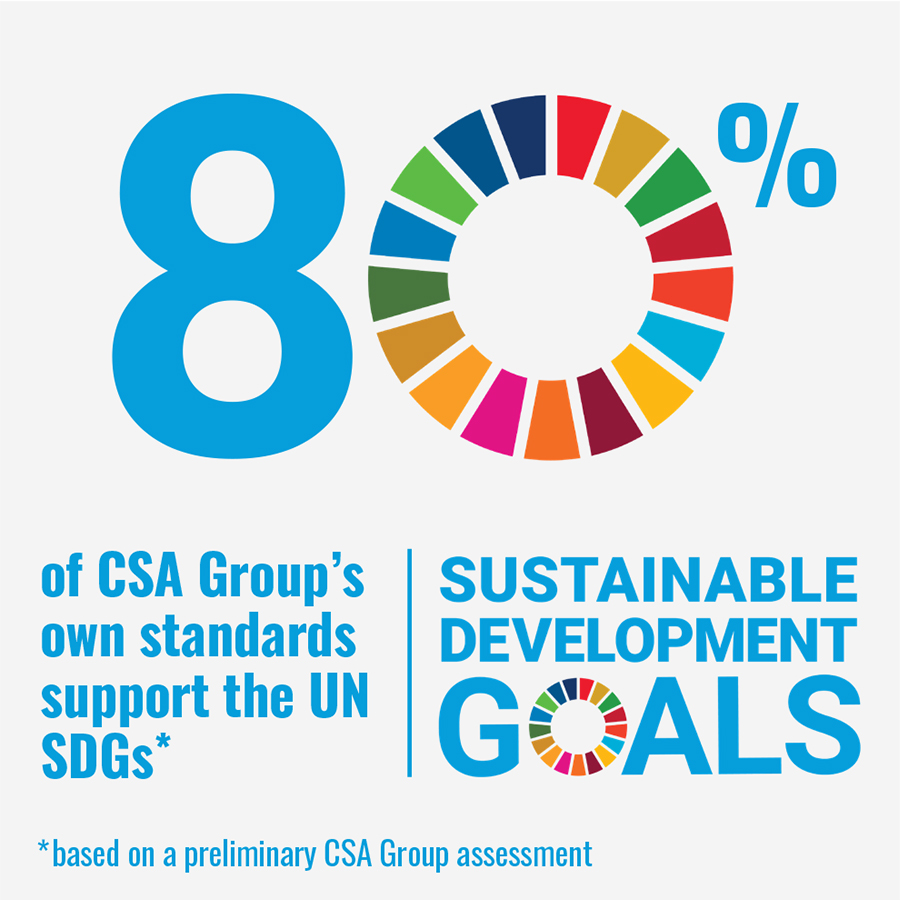
Using standards helps organizations achieve their SDG objectives
by CSA Group
A critical challenge associated with the SDGs as aspirational global instruments is to effectively translate and transpose the language of the goals into practical, granular guidance.

A critical challenge associated with the SDGs as aspirational global instruments is to effectively translate and transpose the language of the goals into practical, granular guidance.
Sustainable development is increasingly important in all aspects of today’s society. With the adoption of the United Nations 2030 Agenda for Sustainable Development, organizations, companies, and governments across the globe are actively developing and implementing strategies to support achievement of the 17 Sustainable Development Goals (SDGs).
A critical challenge associated with the SDGs as aspirational global instruments is to effectively translate and transpose the language of the goals into practical, granular guidance. While the SDG targets and indicators help focus the action, they are silent on what methods and approaches may be used. That poses a challenge for many organizations as they try to find an effective way to incorporate the SDGs into their policies, programs, and operations. Standards bodies such as CSA Group are well-positioned to assist with this challenge.
How do standards support the SDGs?
Unlike the aspirational formulation of the SDGs, standards are typically detailed, technical documents for which actions can be objectively measured and benchmarked. Thus, if a connection can be made between standards use and the goals enshrined in the SDGs, standards can then help provide the complete, concise, controllable, measurable, and understandable characteristics needed to inform the achievement of the SDGs. This approach infers that organizations could take actions to support the SDGs by complying with the requirements and recommendations of standards, whether voluntary or incorporated by reference in regulations.
How are standards connected to the SDGs?
The links between Standards and the SDGs are not always self-evident. Traditionally, standards have not been developed with the SDGs in mind and, therefore, do not directly outline how the technical guidance of the standards matches the intended measurable outcomes of the SDGs.
CSA Group, in collaboration with researchers from the University of Guelph, Niagara College, and Toronto Metropolitan University, has conducted a comprehensive multi-disciplinary research project with the goal of developing a robust and transparent methodology for mapping standards to the SDGs at the target level. Using this methodology to validate any standard-SDG links can provide organizations, governments, policy-makers, and the public with reliable and transparent information and help strengthen confidence in standards as instruments supporting the achievement of SDG-related objectives. Applying the methodology to CSA Group’s own standards portfolio confirmed that 80% of CSA standards support at least one SDG. The following example demonstrates the linkages between standards and SDG targets.
The Canadian Electrical Code
The Canadian Electrical Code, Part I, has been in use across Canada for almost 100 years. Helping ensure the safety of electrical installations, the Code is referenced in provincial and territorial legislation and the National Building Code of Canada.
The latest 2021 edition of the Code introduced substantial changes to facilitate sustainability and address climate resilience. New and updated sections focused on renewable energy sources, such as solar photovoltaic installations and wind-generated electricity, and new requirements for electric vehicles, home-based vehicle charging stations, and energy storage systems. While the Code does not require professionals to install certain low-carbon, sustainable, or efficient technologies, it can play an important role in promoting efficiency and sustainability by continuously adding the requirements necessary for the safe installation of those technologies as they become marketable. This helps legitimize these emerging technologies and make them accessible to a greater population, thereby supporting the targets of SDG 7, Affordable and Clean Energy, such as:
- 1 – By 2030, ensure universal access to affordable, reliable, and modern energy services
- 3- By 2030, double the global rate of improvement in energy efficiency
The Canadian Electrical Code, Part I spotlight study further outlines how the Code supports the targets of SDG 9, Industry, Innovation, and infrastructure, and SDG 13, Climate Action. In total, a further 55 suggested resilience-related changes were updated in the 2021 edition of the code. Simple changes such as moving electrical receptacle installations from 2 feet off basement floors to 4 feet off floor level are improving resilience for all in Canada.

The links between Standards and the SDGs are not always self-evident. Traditionally, standards have not been developed with the SDGs in mind and, therefore, do not directly outline how the technical guidance of the standards matches the intended measurable outcomes of the SDGs.
SDG-related priorities for future standards development
The SDGs have emerged as important and innovative instruments galvanizing governments, businesses, and civil society toward the achievement of a sustainable future. CSA Group’s SDG mapping work ultimately found that standards can provide foundational support to organizations and governments to assist them in meeting their SDGs objectives. CSA Group’s work focused on identifying and building linkages between standards use and the SDGs is an important part of a roadmap toward achieving the goals of the UN 2030 Agenda.
CSA Group is now continuing efforts to better integrate SDG considerations into its current and future standards development and to educate stakeholders and the general public about the important role standards can play in achieving the SDGs. CSA Group’s SDG website provides additional resources, including a searchable database of CSA Standards and their links to specific SDG targets they support. This resource is just the beginning.
It is, however, important to note that while many standards explicitly support SDG targets such as climate resilience, it is recognized that not all standards link to SDGs. Standards users should always take care and be specific when claiming their support of SDGs through the use of standards. The tools and resources made available by CSA Group as a part of this project are intended to assist users in their evaluation of the degree the application of a standard leads to material changes and SDG achievement.
CSA Group always strives to provide up-to-date and accurate information. However, no representation or warranty, expressed or implied, is made that this information meets your specific needs, and any reliance on this information is at your own risk. Please contact CSA Group for more information about our services.
© 2022 Canadian Standards Association. All Rights Reserved.